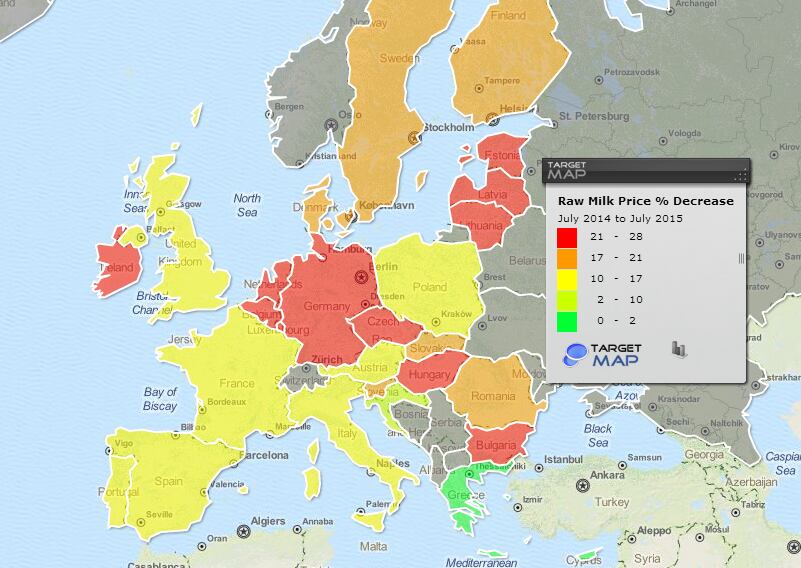Earlier this month, at an emergency Council of Agriculture Ministers in Brussels, the European Commission (EC) presented a €500m "comprehensive package of measures to support European farmers."
The "most significant part" of the EC package will be provided in targeted financial aid to dairy farmers in European Union (EU) Member States.
Aid will be distributed with "particular regard to those Member States and those farmers which have been most affected by the market developments," it said.
The Council of Agriculture Ministers met in Brussels today to thrash out the details.
Ahead of an update - expected tomorrow after a second day of talks - DairyReporter took a look at the impact that factors including the August 2014 Russian ban on Western food imports have had on EU raw milk prices.
Latvian raw milk prices have been worst hit, according to EC Milk Market Observatory data.
Between July 2014 - the month before Russia introduced an embargo on Western food imports - and July 2015, Latvian raw milk prices fell 28% from €29.32 per 100 kilograms of raw milk to €21.04.
Raw milk prices in Hungary (26% decrease), Estonia (26%), Germany (25%) and the Netherlands (24%) have also fallen significantly.
In the same period, milk prices in Lithuania and Finland - countries that received EC financial aid for their dairy farmers last year - fell by 23% and 18% respectively.

In late 2014, the EC provided a €40m support package for dairy farmers in markets considered to have been "particularly adversely affected" by the Russian embargo - Finland (€10.7m), Lithuania (€14.1m), Latvia (€7.7m) and Estonia (€6.9m).
Russian Prime Minister Dmitry Medvedev slapped a one year ban on the import of beef, pork, poultry, fruit, vegetables, milk and dairy products from the EU, United States, Australia, Canada and Norway in August 7 2014.
In June 2015, Russia extended its ban on Western food imports until August 5 2016.
During talks with European Commissioner for Agriculture and Rural Development, Phil Hogan, last month, Lithuanian Prime Minister, Algirdas Butkevičius, said he was seeking an additional €50m in targeted aid for Lithuanian dairy farmers.
A Commission source told DairyReporter then that dairy farmers in Finland and the Baltics - Lithuania, Latvia and Estonia - would be the main focus of the second round of targeted financial aid.
